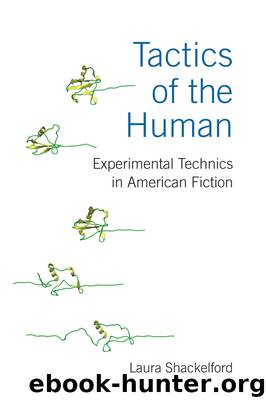Tactics of the Human: Experimental Technics in American Fiction by Shackelford Laura

Author:Shackelford, Laura
Language: eng
Format: epub
Publisher: The University of Michigan Press
Published: 2018-05-15T00:00:00+00:00
The “almanac of the dead” as/and an Enactive, Materially Realized Literary System
The novel’s exacting juxtaposition of these competing materialisms in their capacity to realize lived experience and the possibilities of the world in distinct ways reveals the importance of devising methods able to comparatively register and reckon with the epistemologies that inform distinct material processes of space-making. The novel itself can be understood as a comparative media practice designed to tactically reorient the novel as a symbolic space of literary figuration in relation to the Native American, indigenous American, and subaltern social spaces, national political forms, symbolic and material imaginaries, material lifeworlds, and bodily experience print novels help to co-realize. Almanac of the Dead illustrates that such comparative media practices serve as one invaluable means to recognize these socio-spatial, biopolitical orientations and the material and social relations they open onto and actively foreclose. The novel’s primary and most compelling answer to the question of how one might align and ally oneself with such materially realized space-making processes is provided by the “almanac of the dead” it both doubles and figures.
In explicitly linking its featured “almanac of the dead,” as a figurative space, to the socio-spatial, subaltern networks this dynamic text helps solidifyPage 137 → and realize, the novel reminds us that the literary system is itself already involved in space-making processes. Literary and other figurative spaces are crucial to imagining and materially embodying a sense of cultural and geographic, as well as textual, space. Almanac of the Dead tactically reorients its own novelistic, literary print narrative, reimagining its narrative as a spatio-temporal network that enters into and is transformed by these dynamic, materially embedded social relations. Almanac of the Dead’s engagements with extraliterary, social space-based material practices share key features with recent literary practices, such as locative media narratives, that are similarly distributed across physical and virtual and embodied physical spaces. The novel, in this way, reimagines the literary as a crucial means to reorient the very colonialist and imperialist spatiotemporal logics and social spaces the literary print novel frequently works to resolidify.
The “almanac of the dead” is a notebook of writings and glyphs containing the stories of all “the days and years” of the tribes of the Americas. The almanac comes to be understood as a dynamic means of channeling energy, as a material network that does much more than passively figure these social relations. The pages of the almanac are believed to hold “many forces within them, countless physical and spiritual properties to guide the people and make them strong.”110 Journeying north with four young Indian slaves fleeing European slavery, this “bundle of pages and scraps of paper with notes in Latin and Spanish” eventually makes its way to Lecha and Zeta’s grandmother, old Yoeme, who then leaves it in their care.111 The circulation of the ancient almanac, its spatiotemporal movement, helps consolidate a network of social relations. The almanac’s journeying evidences a logic of flows or exchange that is premised on the mutual transformation of the almanac
Download
This site does not store any files on its server. We only index and link to content provided by other sites. Please contact the content providers to delete copyright contents if any and email us, we'll remove relevant links or contents immediately.
4 3 2 1: A Novel by Paul Auster(12375)
The handmaid's tale by Margaret Atwood(7757)
Giovanni's Room by James Baldwin(7326)
Asking the Right Questions: A Guide to Critical Thinking by M. Neil Browne & Stuart M. Keeley(5757)
Big Magic: Creative Living Beyond Fear by Elizabeth Gilbert(5754)
Ego Is the Enemy by Ryan Holiday(5413)
The Body: A Guide for Occupants by Bill Bryson(5080)
On Writing A Memoir of the Craft by Stephen King(4935)
Ken Follett - World without end by Ken Follett(4723)
Adulting by Kelly Williams Brown(4565)
Bluets by Maggie Nelson(4547)
Eat That Frog! by Brian Tracy(4525)
Guilty Pleasures by Laurell K Hamilton(4439)
The Poetry of Pablo Neruda by Pablo Neruda(4097)
Alive: The Story of the Andes Survivors by Piers Paul Read(4018)
White Noise - A Novel by Don DeLillo(4002)
Fingerprints of the Gods by Graham Hancock(3996)
The Book of Joy by Dalai Lama(3976)
The Bookshop by Penelope Fitzgerald(3844)
